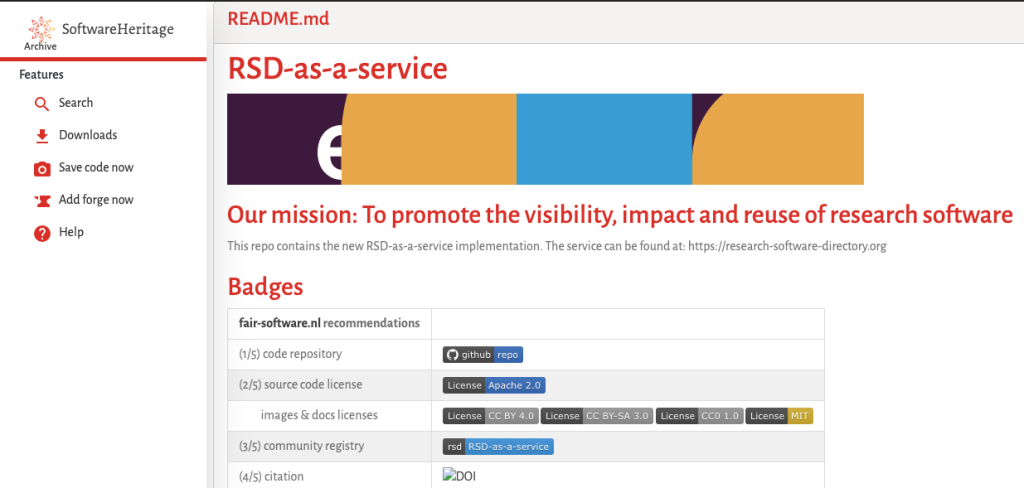Research Software Directory adopts SoftWare Hash Identifiers

The Netherlands eScience Center’s Research Software Directory (RSD) now uses SoftWare Hash Identifier (SWHIDs), a move that helps ensure source code and the knowledge it carries are archived for the long term.
Scientific research relies on the preservation of three essential pillars for its knowledge to be reproducible and transmissible: scientific articles that describe the findings, datasets that underpin them, and the software that embodies the logic of data transformation.
With a community of 2,023 research software contributors, the RSD currently houses 1,020 registered software packages across 342 projects from 517 contributing organizations, resulting in over 27,200 software mentions. By integrating SWHIDs, the RSD ensures this important research output is accessible, reproducible, and interoperable.
Drawing on a decade of experience, Software Heritage created the SoftWare Hash Identifier (SWHID), a globally recognized standard that tracks over 50 billion software artifacts. This identifier, originally known as the Software Heritage Identifier, has evolved into a community-driven schema designed for universal adoption recognized with an ISO International Standard.
For a clearer picture of how this works, take a look at the RSD’s page for their own software at: https://research-software-directory.org/software/rsd-ng
You’ll see that the specific versions of the software are permanently archived and citable.

Beyond improving citation and preservation, the integration of SWHIDs also opens new possibilities for automated reproducibility workflows. Because each identifier captures the precise state of the source code, it can serve as a verifiable reference point in computational pipelines, notebooks, or datasets. This allows tools and repositories to automatically retrieve the exact version of software used in a study, reducing ambiguity and human error in reproducing results.
Why is this important? This adoption represents another step in the adoption loop. As described in the Open Science Strategic Blueprint, this process moves from raising awareness to actual adoption and then to advocating for the change.
RSD co-authored the 2020 Scholarly Infrastructures for Research Software (SIRS) report, which recognized the need for standardized guidelines for self-archiving and publishing software. SWHID is one of the aggregators recognized at the European level, named in that report, that helps meet this need.
The RSD’s use of SWHIDs helps push the community forward on this path, supporting the commitment to open and FAIR principles (Findable, Accessible, Interoperable, Reusable) for software.
Ultimately, this initiative is a significant step toward a more connected infrastructure. SWHIDs are crucial because they enable interoperability across different platforms. This means it becomes easier for information about research software to be shared and linked across various services. The result is a more efficient environment for research software that benefits everyone, from developers to researchers and the wider scientific community.
This milestone also aligns with the ongoing efforts of the SciCodes Consortium—a global network of research infrastructures and registries collaborating to improve the discoverability, interoperability, and preservation of research software. Within this consortium, Software Heritage works alongside other initiatives such as swMath, ASCL, Zenodo, and the Research Software Directory to define and promote shared metadata practices and persistent identifiers like SWHIDs.These collaborations are essential to building a cohesive scholarly infrastructure, ensuring that software remains an integral and citable component of the scientific record.
The continued adoption of standards like SWHIDs by organizations like the RSD is vital for the health of open science. It helps create a stronger, more interconnected ecosystem where every piece of software is properly credited and preserved for future generations. This is a crucial part of building the foundational infrastructure for a fully open and transparent scientific community.
To build on this momentum, we invite all research infrastructures, repositories, and publishers to join this collective effort by adopting Software Heritage Identifiers (SWHIDs) in their platforms and workflows.
